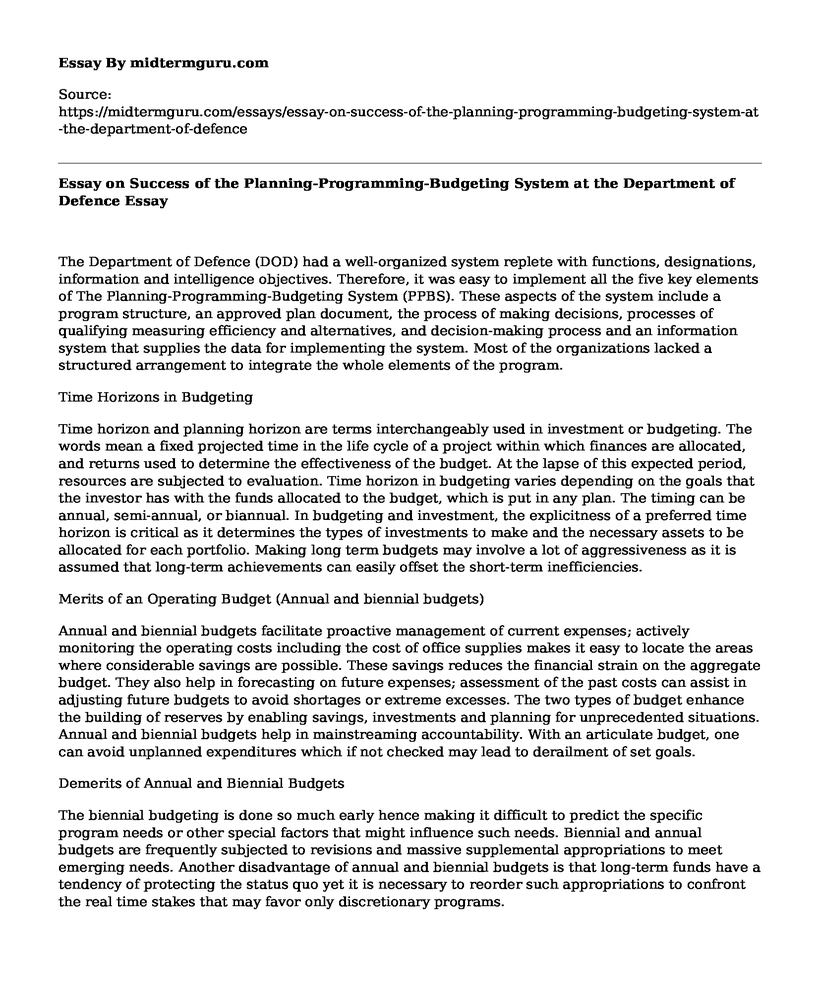The Department of Defence (DOD) had a well-organized system replete with functions, designations, information and intelligence objectives. Therefore, it was easy to implement all the five key elements of The Planning-Programming-Budgeting System (PPBS). These aspects of the system include a program structure, an approved plan document, the process of making decisions, processes of qualifying measuring efficiency and alternatives, and decision-making process and an information system that supplies the data for implementing the system. Most of the organizations lacked a structured arrangement to integrate the whole elements of the program.
Time Horizons in Budgeting
Time horizon and planning horizon are terms interchangeably used in investment or budgeting. The words mean a fixed projected time in the life cycle of a project within which finances are allocated, and returns used to determine the effectiveness of the budget. At the lapse of this expected period, resources are subjected to evaluation. Time horizon in budgeting varies depending on the goals that the investor has with the funds allocated to the budget, which is put in any plan. The timing can be annual, semi-annual, or biannual. In budgeting and investment, the explicitness of a preferred time horizon is critical as it determines the types of investments to make and the necessary assets to be allocated for each portfolio. Making long term budgets may involve a lot of aggressiveness as it is assumed that long-term achievements can easily offset the short-term inefficiencies.
Merits of an Operating Budget (Annual and biennial budgets)
Annual and biennial budgets facilitate proactive management of current expenses; actively monitoring the operating costs including the cost of office supplies makes it easy to locate the areas where considerable savings are possible. These savings reduces the financial strain on the aggregate budget. They also help in forecasting on future expenses; assessment of the past costs can assist in adjusting future budgets to avoid shortages or extreme excesses. The two types of budget enhance the building of reserves by enabling savings, investments and planning for unprecedented situations. Annual and biennial budgets help in mainstreaming accountability. With an articulate budget, one can avoid unplanned expenditures which if not checked may lead to derailment of set goals.
Demerits of Annual and Biennial Budgets
The biennial budgeting is done so much early hence making it difficult to predict the specific program needs or other special factors that might influence such needs. Biennial and annual budgets are frequently subjected to revisions and massive supplemental appropriations to meet emerging needs. Another disadvantage of annual and biennial budgets is that long-term funds have a tendency of protecting the status quo yet it is necessary to reorder such appropriations to confront the real time stakes that may favor only discretionary programs.
Cite this page
Essay on Success of the Planning-Programming-Budgeting System at the Department of Defence. (2021, Jun 03). Retrieved from https://midtermguru.com/essays/essay-on-success-of-the-planning-programming-budgeting-system-at-the-department-of-defence
If you are the original author of this essay and no longer wish to have it published on the midtermguru.com website, please click below to request its removal:
- Transformational Leadership and Employee Motivation in the Hospitality
- Simulation of Faboulous Four Company - Paper Example
- Discussion Questions on Healthcare Leadership Paper Example
- Essay Sample on Intrinsic Motivation
- Maglev Train Project Report
- The Role of the HRD and How It Contributes to the Organization's Strategic Goals - Paper Example
- Strategic Planning: Establishing Direction & Chaotic Strategies - Research Paper







